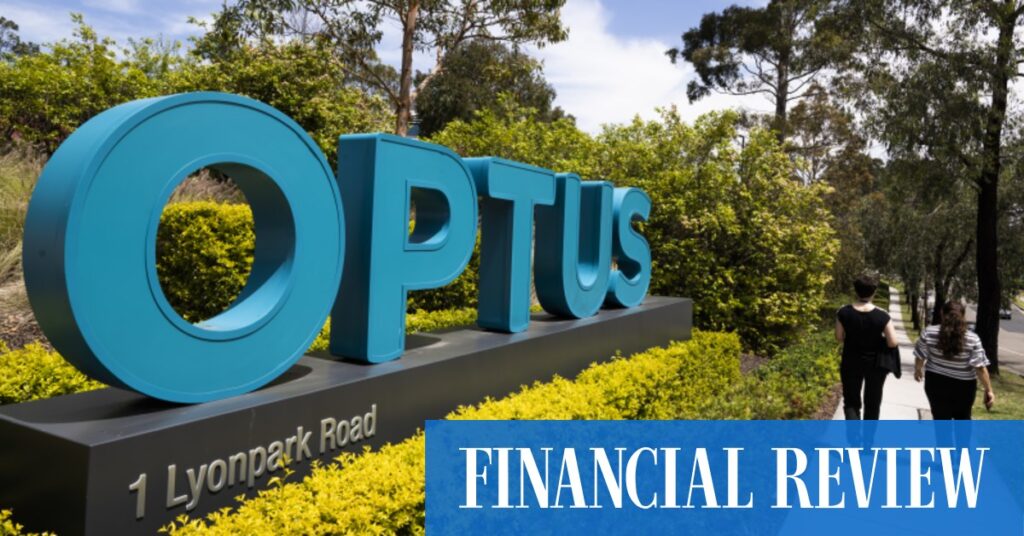The value of Temasek’s portfolio dropped to $S382 billion ($433 billion) from $S403 billion – its worst result in seven years. Management signalled it wanted to increase investments in India and South-East Asia, two hotspots for global growth.
Singtel has previously underlined that Mr Lee is not a Temasek nominee. But Mr Lee is well-connected; during his eight years on the Temasek board, he has worked with key figures including Ho Ching, the wife of Singapore’s Prime Minister Lee Hsien Loong.
Shareholders decide
Depending on the size of the transaction, a part or full Optus divestment would likely have to go to a shareholder vote.
Singapore listing rules require any transaction valued at 20 per cent or more of net assets must be immediately announced. Such transactions are conditional on shareholder approval.
The Financial Review’s Street Talk column reported on Wednesday evening that Singtel was in advanced discussions over a mooted $16 billion deal with Brookfield, sending the Singaporean company’s shares up almost 4 per cent to their highest level since August 2023.
The stock rose S2¢ to trade at $S2.50 on Thursday despite Singtel disputing a deal is imminent at that valuation. “Optus remains an integral and strategic part of the Singtel Group and we are committed to Australia for the long term,” the company said in a statement.
However, Singtel also confirmed it regularly does “strategic reviews of our portfolio to optimise the value of our assets and businesses and will explore all options to maximise shareholder value”.
Singtel is not under financial pressure to sell Optus – it has a strong balance sheet. But it wants to boost its share price and return capital. In November, it told analysts that its ongoing asset recycling program had yielded $S7 billion and it planned to “unlock” a further $S4 billion in the next two to three years.
Chief financial officer Arthur Lang said last week that Singtel’s stock price was not reflecting “the intrinsic value or growth potential of the group”.
Last year’s Optus network outage, which forced the departure of chief executive Kelly Bayer Rosmarin, has also hurt its profitability. Singtel’s group net profit slid 12.5 per cent to $S465 million in the December quarter after the company took $S94 million of “exceptional items”, including $S54 million of costs related to the outage.
And last week Singtel lost a bid to get almost $895 million deducted from its taxable income in Australia in a Federal Court victory for the Tax Office.
Singtel is understood to have become more deeply involved in the day-to-day running of Optus since Ms Bayer Rosmarin’s departure. The boss of Optus Networks’ business, Lambo Kanagaratnam, resigned last week.
The Optus business, along with Singtel’s Singapore telco operations, generate substantial cash flows. If a deal is struck with Brookfield, Singtel is expected to hang on to Optus’ valuable consumer mobile business, which has almost one-third of the Australian market.
Divestments to raise cash
Brookfield, one of the world’s biggest infrastructure investors with a track record of making money out of poorly performing companies, declined to comment.
Brookfield has traditionally favoured energy investments and heavy infrastructure like ports and rail, but it has invested in some telecommunications groups, including Vodafone New Zealand (renamed One New Zealand) and French group TDF.
Brookfield last year sold its stake in the NZ business to infrastructure investor Infratil for $NZ1.8 billion ($1.7 billion), and has been trying to sell all or part of TDF.
While Optus is among Australia’s top three telco brands, it is facing tougher competition from smaller groups and its brand was hurt by last year’s phone and internet outage and a previous cyberattack.
The competition watchdog’s latest quarterly report on market share of the national broadband network, released on Thursday, found that Aussie Broadband, Vocus and Superloop gained over 62,000 wholesale services in the December quarter, while the total number of residential broadband services remained steady.
Superloop shares gain
Aussie Broadband’s services rose by more than 30,000, while Vocus and Superloop each increased their services by around 15,000 each.
Aussie Broadband made a $466 million takeover bid for Superloop in late February after snapping up a near 20 per cent stake in the smaller company, which was rejected by Superloop’s board.
The two companies have been competing aggressively for customers. Superloop on Thursday said it had snapped up Origin Energy as a wholesale customer and would add 130,000 extra accounts onto its network in fiscal 2025.
Superloop will issue some $15 million worth of shares to Origin Energy as part of the deal, which it said would help it hit the high end of its fiscal 2024 underlying earnings target. Origin Energy will also get options to buy up to 10 per cent of Superloop’s shares over the next 12 months.
Superloop chief executive Paul Tyler denied this arrangement was a defence tactic against another potential Aussie Broadband takeover bid, arguing it was about Origin having the option to take “a meaningful part in a telco if they choose”.
Superloop’s shares jumped 25 per cent to close at $1.31.
“Given the growth profile of Aussie Broadband, and the retail and wholesale opportunities we are pursuing, we took the view that it was important that a disciplined approach to assessing contracts and how capital is deployed is critical,” Aussie Broadband managing director Phillip Britt said.
Aussie Broadband’s shares slid 18 per cent to $3.55.

